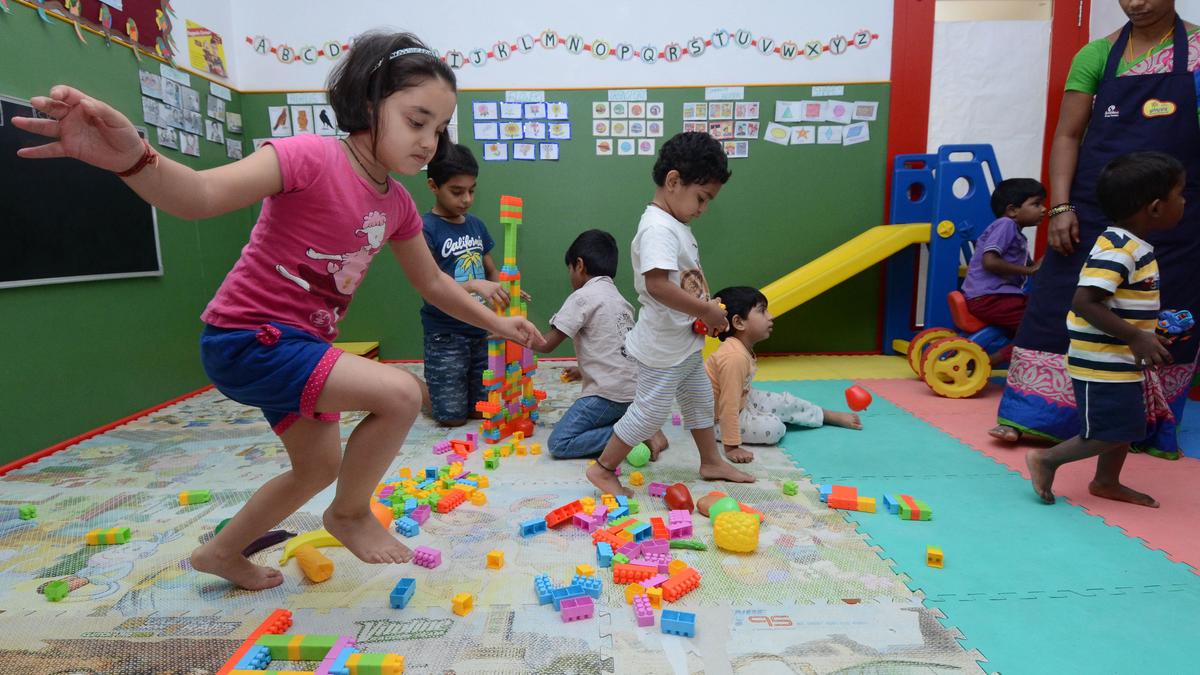
A representational photo of children in a crèche.
| Photo Credit: Nagara Gopal
“When my father’s health started to decline due to old age, I found myself struggling with caregiving responsibilities and with my professional commitments. My company supported me with flexible work hours and remote work options. It allowed me to be present for my parents when they needed me the most, while still being able to deliver on my work responsibilities,” said an employee of SAP, India.
With conversations around work-life balance taking centrestage in recent times, many corporate companies have begun to devise caregiver policies that provide flexibility and additional facilities to their employees to take care of their ailing family members. From on-site child and elderly care facilities to remote work options, scattered working hours, paid caregiver leaves, increased insurance coverage, counselling services, much more are included in the caregiver policies.
Most companies extend these benefits to employees who are required to take care of their immediate family members like spouse, children, parents or siblings.
“The criteria for identifying someone as a caregiver depends on the relationship and employee’s needs. We sometimes extend the benefits to family members like grandparents, aunts or uncles, or cousins. We also consider the nature of the employees’ needs. For instance, if they have a child or dependent with special needs or disability that affects their daily functioning,” Shweta Mohanty, Vice President, Head of Human Resources, SAP, India.
Some companies allow employees to take leave from 4 to 24 weeks in case of a medical emergency which affects them or a family member.
“In our company we have two kinds of options for such leaves. Under one, it is considered as leave of absence and we do not get paid. Under the second option, the company pays 20% of our base salary. These benefits are subject to approval from team leaders and HR executives,” said an employee who works in an MNC in Bengaluru.
Community support
The companies also focus on creating an inclusive community of caregivers within the organisation who can support each other in various ways. They invite experts who can hold seminars or workshops on management of caregiver stress with yoga, caregiving methods and mental health.
“We have set up employee resource groups where caregivers can connect as a community, and share, listen, and learn from each other’s experiences. These include support groups for parents, including communities like single parents and adoptive parents, caregivers to the neurodiverse, and caregivers to the elderly. All these groups have seen meaningful membership and engagement,” said Lakshmi C., Senior Managing Director and Lead – Human Resources, Accenture in India.
“We host workshops led by experts, focusing on topics like children’s mental health, sex education among children, caring for dependants with disabilities or neurodiverse needs, navigating challenges while caring for elders, and helping women overcome caregiver stress,” she added.
Jaya Gupta, an employee in the same company, spoke about how the child-care facilities and community groups offered by the company helped her in her responsibilities as a single mother.
“As a single parent to a three-year old, juggling the commute to work while managing childcare and finances was daunting until 1.5 years ago, when I enrolled my child in an Accenture-affiliated day care centre located close to my workplace. Knowing that my child is nearby and well-cared-for brings peace of mind and allows me to focus better on my work. In addition, joining the employee resource group for single parents has been a lifeline. Over time, this group has become a community where we share experiences, and lift each other up, especially during the tougher days,” Ms. Gupta said.
Published – December 18, 2024 10:28 am IST
#Corporates #devise #policies #employees #familial #responsibilities


